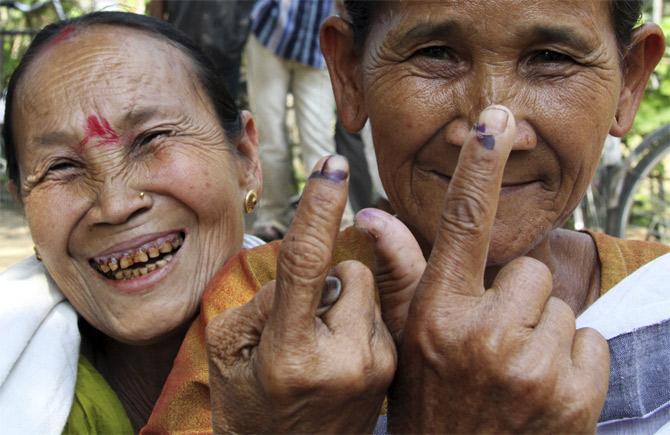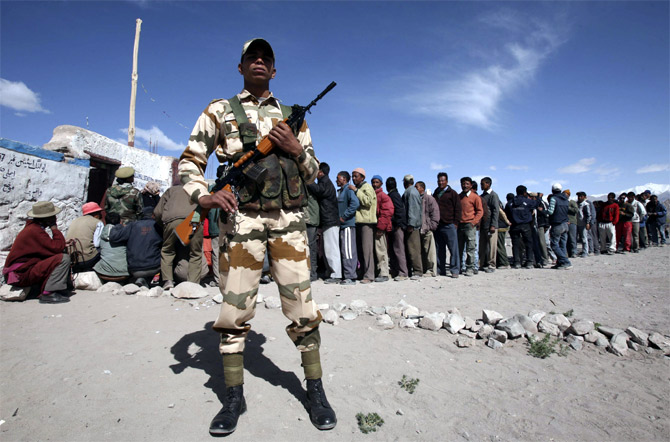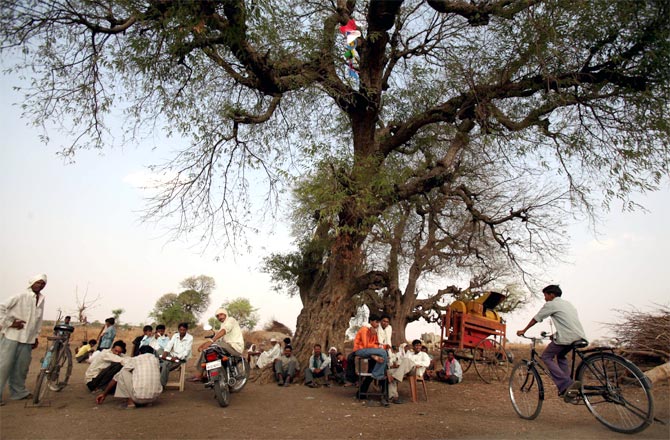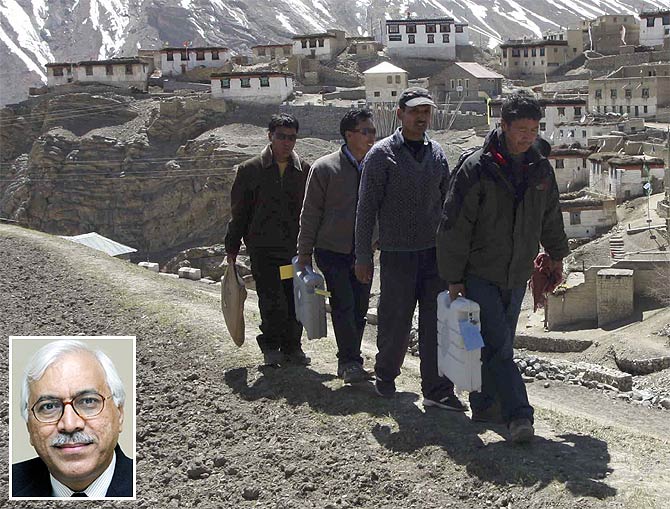 | « Back to article | Print this article |
'We expect a zero error election; 100% successful to the last booth'
'In the Uttar Pradesh election last time, there were four presiding officers who had a heart attack on the day of the poll. It is a high pressure job and we must compliment our bureaucracy,' says former Chief Election Commissioner S Y Quraishi who headed the Election Commission in the 2009 general election.
11 million people inducted for poll duty. 936,000 polling stations. 814 million voters. Elections spread over 36 days. 100 million young first-time voters... it does not get bigger than the Great Indian Election.
Called the greatest man-made exercise and conducted with admirable competence by the Election Commission of India, it has proved over elections past that the much maligned sarakari babus can deliver when it comes to this mammoth democratic event.
"It's a high pressure job and who are these presiding officers? They are our bhai and behen (brothers and sisters), they could be teachers or local junior officials, they are the guys who man these elections, says Shahabuddin Yaqoob Quraishi, an IAS officer with a six-year stint at the Election Commission, two of those as Chief Election Commissioner.
During his tenure, Mr Quraishi conducted the general election to the 2009 Lok Sabha, besides elections in many states and played a key role increasing youth voter participation.
An alumnus of St Stephen's College in New Delhi, he has spent nearly 40 years in India's civil service before his retirement in 2012.
In an interview to Rediff.com's Archana Masih, the civil servant and avid musician spoke through anecdotes and experience about what goes into making the greatest democratic event on earth.
It is called the greatest man-made exercise in the world -- how much time does it take for the Election Commission to decide on the poll dates?
If you are talking only about the schedule, the scheduling must have begun a couple of months ago. Making a list of all the holidays -- local, national, religious, cultural, agricultural -- we have to take all that into account.
It may appear very simple, but the file about the holidays is about 10 inches thick and 5 kgs in weight.
Going through them takes time and even then some mistakes happen because some region may have a local festival and they may complain to the Election Commission that polling should not happen that day.
This is a 9 phase-election, but to me for all practical purposes, there are only 6 phases.
Three are just incidental only to accommodate some local issues.
If you see the first 4 phases -- April 7, 9, 10 and 12 -- for me April 10th is the first phase.
April 7, 9 and 10 are just incidental for local accommodation -- like for the Bihu festival in Assam. So these are local adjustments and should not be regarded as phases, these are dates.
In every phase, there are normally be 80, 90, 100 constituencies, whereas on April 7, 9 and 12 all together there are only 18 constituencies that will be going to the polls.
The much maligned government staff is the backbone of the great poll exercise and this is something they conduct with competence, how much training does the polling staff get for this mammoth task?
The fact is that 11 million people are inducted for poll duty and the fact is that we expect a zero-error election.
It can't be 60%, 70% successful, it has to be 100 per cent successful to the last booth.
Even a mistake in one booth results in a repoll, so training is very important.
The poll staff is trained in three phases, two days in each phase.
Of course, different levels and different aspects are there, but normal polling parties are trained very meticulously and given hands on training.
Sometimes mistakes are made because of sheer nervousness so we have to provide for all that.
It is a high pressure job and we must compliment our bureaucracy.
In the Uttar Pradesh election last time, there were four presiding officers who had a heart attack on the day of the poll.
It is a high pressure job and who are these presiding officers? They are our bhai and behen (brothers and sisters), they could be teachers or local junior officials, they are the guys who man these elections.
Please click Next to read further...
'Security forces are told that if they suspect a threat, they should stop and come back'
India's first general election was conducted over 6 months -- considering our country's vastness, what are some of the difficulties geography poses?
Of course, that is a very major issue. There are very difficult terrain. We have to conduct elections in snow-covered mountains, deserts, remote islands... everywhere.
We have now the experience and the machinery, we have been doing it for so many years -- so now it comes naturally.
The expenditure limit has been raised. In spite of this, it is known that candidates spend Rs 3 crores to Rs 5 crores on campaigning. How do you see the Election Commission countering the problem of money power in this election?
What we hear -- Rs 3 crore, 4 crore, 5 crore -- is only anecdotal whereas we have to go by evidence.
There is a very strong possibility that what you are saying is correct. The Election Commission set up an expense monitoring division basically with the purpose of tightening expenditure control.
This was set up in 2010. We set up guidelines that every contestant has to open a bank account and all campaign expenditure has to be from that bank account so that monitoring is easy.
Then we set up flying squads to see if money and other materials are being distributed. We keep an eye on banks -- on large withdrawals of cash during those days on our radar which could be for bribing the voters.
We also conduct raids based on complaints or suspicion that money is being distributed.
All these efforts put some fear of God in their heads.
In Tamil Nadu and Kerala and some others state -- Rs 73 crores were seized, of which Rs 62 crores was in Tamil Nadu alone.
In some states the money problem is more, in some it is less.
In Kerala, if you ask the people, they probably will say that they don't have such a problem because their voters are smarter.
Therefore, parties know that money will not make them change their minds so they don't even give the money.
What, according to you, will be some of the biggest concerns for the Election Commission in this election?
Our biggest concern always is having a peaceful election, with no loss of lives, no booth capturing.
Free, fair and peaceful.
Ensuring the security of the voter, polling parties, and we are even concerned about the security of the security forces.
Like in areas suspected to have landmines -- our security forces are told that if they suspect that there may be a threat in front, they should stop and come back.
The Election Commission will postpone the election and do it a couple of days later with more enforcement, but they shouldn't risk their lives.
The foremost worry is about the safety aspect -- then, of course, money power continues to be a big problem, although the Election Commission with its checks has made life difficult for candidates and parties who want to spend money.
To a certain extent the problem has been controlled, but still they can come up with new ideas because it's all black money.
Please click Next to read further...
'CECs have delivered with great autonomy and independence'
You've said that 100 million new voters will vote in this election. Do you sense an awakening in the youth about the power of their vote, especially because the youth remains largely disillusioned by politics?
We have found a lot of urban apathy, especially youth apathy and to deal with that we set up the voter education division basically to create youth awareness and awareness among women.
We started three years ago. In the 22 states that went to the polls in the last two years -- we began with a survey done by agencies commissioned by us to do a knowledge, attitude, behaviour, practice, KABP, survey to know the reason for this apathy.
We found that many did not know that 18 is the legal age to vote.
Secondly, even if they knew, they did not know the procedure and process involved.
Thirdly, they had contempt for politics -- all these things we thought were communication issues and our strategy was basically to deal with these issues.
So we came up with many youth-related programmes and the National Voters Day. We requested the government to declare January 25 as National Voters Day which they did gladly. We started identifying beforehand those who turned 18 by January 1.
In the very first National Voters day in 2011, 18 million people were give their voter cards which were mostly young people, of which 5.2 million had just turned 18.
There were others who were 19, 20, 21 years of age, but 52 lakh of the 1 crore 80 lakh had just turned 18.
This was launched by President Pratibha Patil in the presence of 35 Election Commissioners of the world.
The next year, the new voters that were added went up to 38 million; in the third year it was about 32; 4th year it was about 37 -- so the 100 million new voters is basically because of the specific efforts we made along with the normal programmes, role upgradation etc that goes on.
Since the time of T N Seshan, the Election Commission has emerged as one of India's most respected institutions - what are some of the reasons behind the Election Commission gaining this position?
It's not that people before Mr Seshan did not do a great job. In fact they laid the foundation.
The foundation for a good institution was laid by the Constitution itself when it created an independent institution that does not come under anybody's control.
The Chief Election Commissioner is appointed and cannot be removed except through a process of impeachment.
Fortunately, the series of CECs we have had have been very true to the Constitutional mandate and they all delivered their function with great autonomy and independence.
As a result their reputation went on consolidating.
Please click Next to read further...
'There was a time when getting even one company (of security forces) was tough'
For the first time IPS officers will be inducted in the Lok Sabha polls. Why do you think the Election Commission thought that they were needed?
The Election Commission is always evolving, like the expenditure division, voter education division were created in 2010 and have contributed a lot.
During the West Bengal election, we found law and order was a major issue. So on an experimental basis we sent a team of four IPS observers and they came back with very good feedback.
We sent many more after that and then made it a policy that in difficult areas where law and order becomes a major issue, we will also send these observers.
How vulnerable are poll officials to pressures by political parties?
Two things, the bureaucracy is permanent and they are professionals while political parties come and go.
So temporarily some of the babus can be pressurised or influenced by the ruling party or by whichever party and they may work under intimidation, threat or persuasion, bribe.
The Election Commission identifies them.
When Opposition parties complain (about such officials) and come with documents, it takes their complaints very seriously.
For the Election Commission neutrality and non partisanship is totally un-negotiable.
Zero tolerance.
It doesn't want to take any chances because a huge exercise like the election has to be delivered within a very short time.
If there is suspicion that the person will not be able to deliver or is weak to resist or is corrupt, it is better to immediately replace them with more acceptable and honest people.
So when you have to remove someone, how difficult is it? Does it entail the Election Commission getting into a battle with the state government?
There used to be a serious battle fought earlier, but that isn't so because of the contribution of the Supreme Court.
Even in Mr Seshan's time many states would refuse to take action against a defaulting officer. So the Supreme Court has been helping the Election Commission.
They have been guarding our independence through a series of judgements. According to the Supreme Court whatever staff the Election Commission asks for will be given.
These staff will be deemed as people on deputation, although the Constitution in any case provided the provision that the Election Commission could ask the Governor or President to ask anyone to do (poll) duty, but they used to drag their feet on many occasions.
This also applied to whatever force was asked for. There was a time when getting even one company was tough -- like in Mr Seshan's time, the home ministry wasn't giving it. Now whatever the Election Commission asks for, they give. The hold over the bureaucracy increased after the Supreme Court judgment of 2003.
What happened with Arvind Kejriwal in Gujarat and its repercussion in Delhi, do you think we are in for a violent election this time?
I don't think so because yesterday (March 5) was the first day of the Model Code of Conduct. The Election Commission's machinery also will take a day or two to come into operation.
I don't think you should not just judge it by what happened within just a few hours of the elections being called.
Of course, problems will be here and there.



